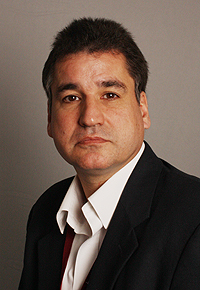Trusted Resources: People & Places
Healthcare providers, researchers, and advocates
Simon Dyson, PhD
Researcher Professor of Applied Sociology
De Montfort University
The Gateway, LE1 9BH
Leicester, United Kingdom
Simon Dyson is Professor of Applied Sociology and is Director of the Unit for the Social Study of Thalassaemia and Sickle Cell at De Montfort University in the United Kingdom.
His research interests include all social aspects of the world’s leading genetic conditions, sickle cell thalassaemia. He has had seven books published, including Ethnicity and Screening for Sickle Cell and Thalassaemia; Sickle Cell and Deaths in Custody (with Gwyneth Boswell) and Genetics and Global Public Health: Sickle Cell and Thalassaemia (with Karl Atkin).
He has written numerous articles on the social and political aspects of sickle cell, including such topics as the politics of racism and sickle cell; the experiences of young people with sickle cell, sickle cell and school education, and sickle cell in Africa. He is a scientific advisor to the UK Sickle Cell Society and has spoken on sickle cell at international conferences in North America, Europe and Africa.
Representative Publications:
Resignifying the sickle cell gene: Narratives of genetic risk, impairment and repair
Narrative as re-fusion: Making sense and value from sickle cell and thalassaemia trait
Living with sickle cell disease and depression in Lagos, Nigeria: A mixed methods study
Patient experience. Improve access to SCD services
Sickle cell and thalassaemia: global public health issues come of age
Related Content
-
A Comparison of an Individualized and Weight-Based Opioid Protocols for the Treatment of Vaso-Occlusive Episodes in ...Introduction: Vaso-occlusive episodes ar...
-
Dental Health in Children with Sickle Cell DiseaseWhat is Sickle Cell Disease? Sickle Cel...
-
Fondation Pierre FabreRecognized as a public utility since 199...
-
Children’s Healthcare of Atlanta Sickle Cell Disease ProgramChildren's Healthcare of Atlanta's Sickl...
-
Keith Quirolo, MDDr. Keith Quirolo is a pediatrician in O...
-
Matthew Karafin, MD, MSMatthew Karafin, MD, MS is the associate...
-
Sickle Cell Disease Coalition (SCDC)https://www.youtube.com/watch?v=oQP-Uq0B...





 +myBinder
+myBinder
